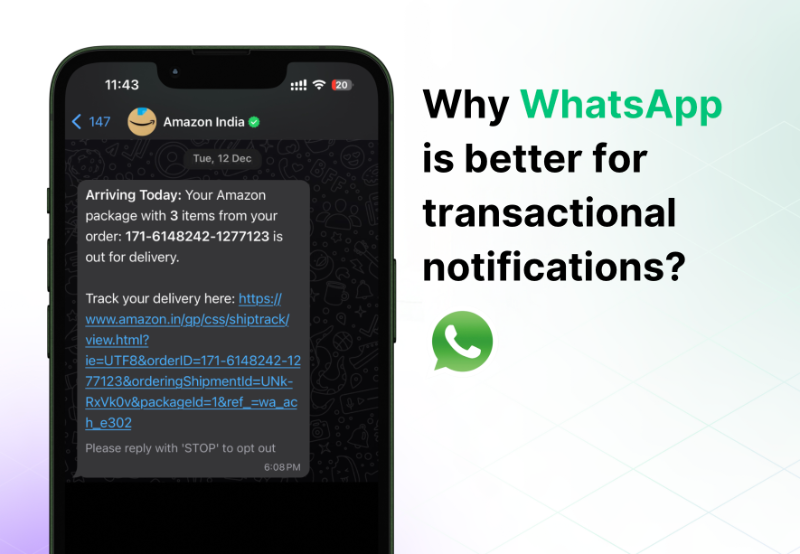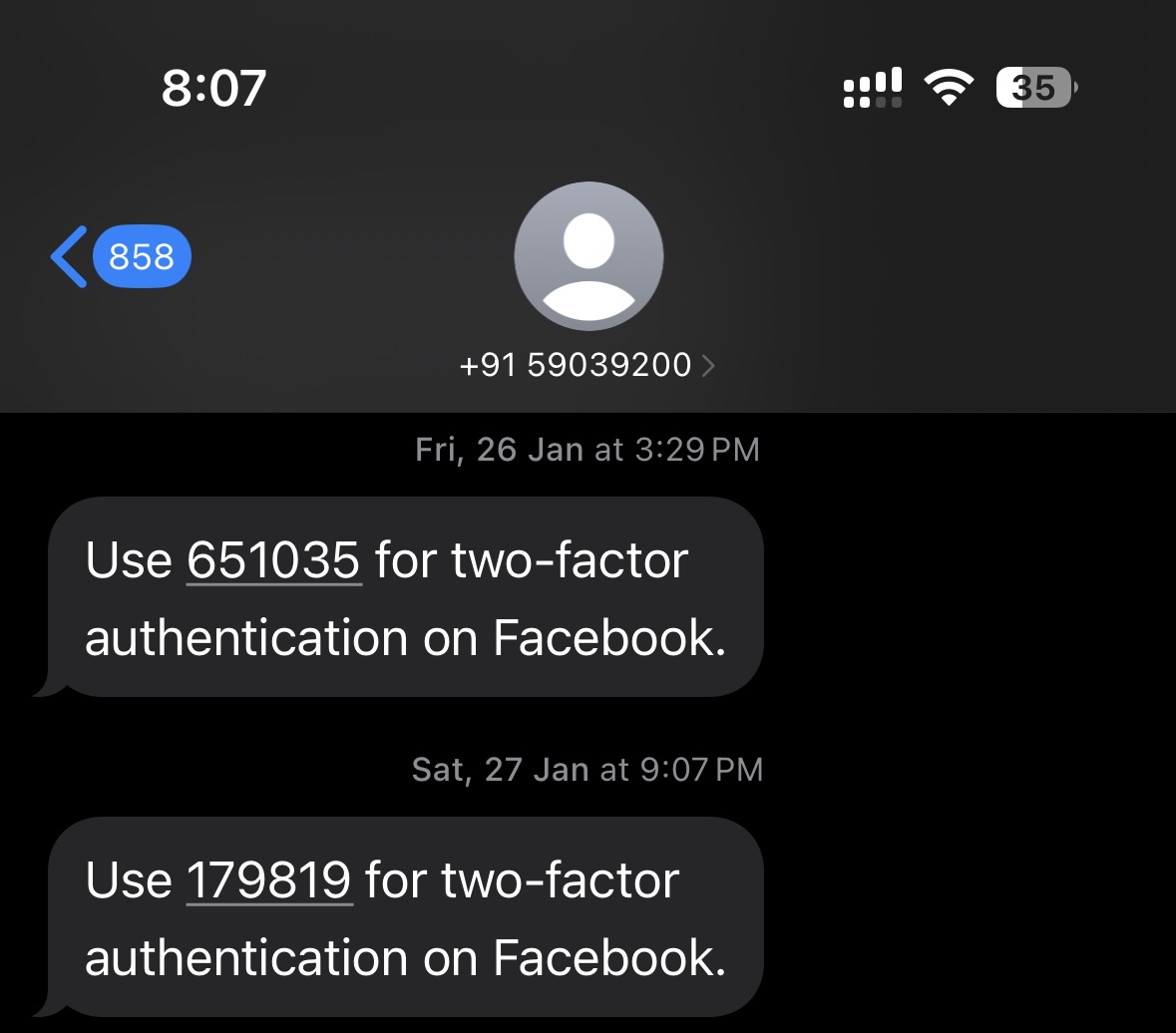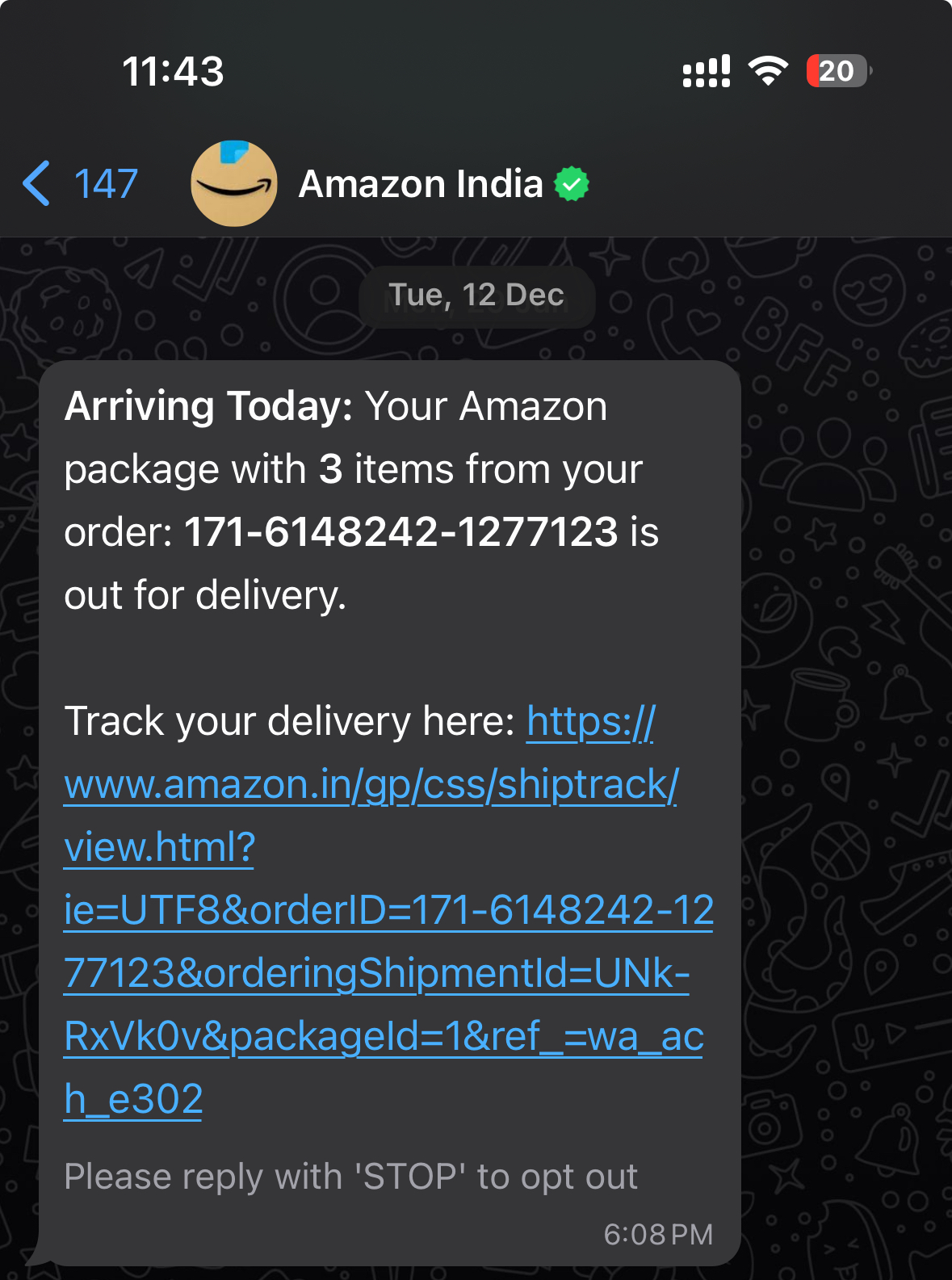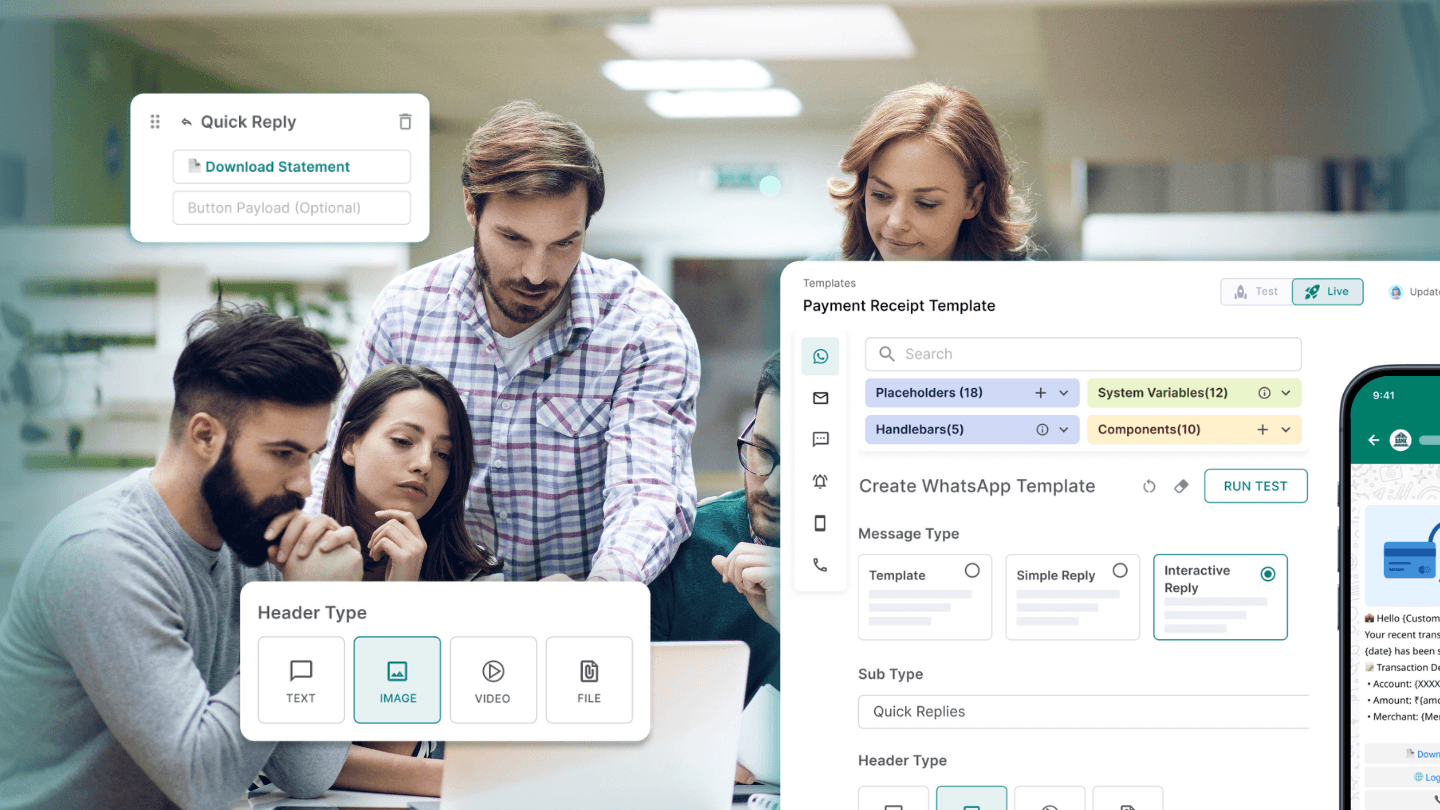In our fast-paced digital world, the efficiency and effectiveness of business communication channels are paramount. Transactional messages, defined as automated, non-marketing messages businesses send to facilitate a transaction or provide a service update to the customer, stand at the core of this communication revolution.
These messages include order confirmations, shipping notifications, appointment reminders, authentication OTPs, and much more. Given their wide reach and direct customer access, businesses have traditionally relied on SMS (Short Messaging Service) to send these critical communications.
However, the landscape of transactional communications is rapidly changing, driven by evolving technology and changing consumer expectations. Despite the ubiquity of SMS and email, recent statistics reveal a shift towards more interactive and feature-rich platforms.
According to a study by Twilio, while SMS and email continue to dominate, an increasing number of businesses are exploring alternative channels like WhatsApp, which offer enhanced engagement, security, and brand visibility. WhatsApp requires a stable internet connection to function, unlike SMS, which can be sent without it, making SMS a reliable choice in areas with poor connectivity.
Before understanding why WhatsApp is picking up pace or how newer channels like Rich Communication Service (RCS) are finding opportunities, it is important to understand what’s wrong with legacy platforms like SMS and Email.

The inefficiencies of SMS for transactional communications
While SMS has been a leader for many years, its limitations are becoming more apparent. SMS technology is now considered ancient and non-evolving, leading to survival risk. Despite these limitations, SMS marketing remains effective due to its direct and immediate communication capabilities. Here are the top 11 problems that persist in SMS technology that are leading to its downfall:
Lower delivery rates: SMS delivery is unreliable and impacted by carrier issues and signal availability. The best delivery rate that businesses can achieve at scale is ~ 90%.
If SMS is used as a channel for delivering OTPs for authentication at the time of login, it means 10% of users drop off at the time of login.
If SMS is used to confirm a payment, 10% of the total users cannot complete the purchase, directly resulting in revenue loss.
In fact, this is one of the biggest reasons for credit and debit card payment failures. Neo-banking companies like OneCard have eliminated this issue by eliminating SMS for authentication and using swipe technology on the application.
Additionally, the limitations of SMS in sending bulk or automated messages impact marketing communication strategies. Platforms like WhatsApp restrict such practices, pushing businesses to explore alternatives like SMS marketing, which allows effective mass messaging while enabling personalization.
Vintage technology: SMS works on a complex SMPP protocol, which is an age-old technology in the world where people are building advanced applications on blockchain. There has been very limited innovation in this technology. Most of the innovations are happening on internet-led messaging platforms like WhatsApp.
Lack of trust indicators: SMS, with its limitations on sender ID formatting, often reduces brand names to unrecognisable abbreviations, with random prefixes (such as TX/VX/KX) followed by a mere six characters for the actual name. Moreover, the inability to include logos or images further diminishes brand presence in SMS communications.
Inconsistent delivery rates: The delivery rates for SMS can vary widely based on geographic regions and local telecom provider policies. This inconsistency can lead to messages not reaching their intended recipients, which is particularly problematic for transactional notifications that require timely delivery.
The blockers for global businesses to send SMS in India: Global companies like Amazon, Google, YouTube and Facebook cannot send messages to their users in India using the normal route. They have to specifically use the International Long Distance Operator route to send SMS in India.
Under this route, they are forced to use random numbers to send messages in India, which can confuse customers and erode trust (see Figure 1 below for a screenshot of SMS from Facebook under the ILDO route). This also costs them ~ INR 4 for each SMS. Whenever you trigger a 2-factor authentication code via SMS from Facebook or Google, they spend ~ INR 4 to send you the code.
Recognizing these challenges, many global companies are now migrating their transactional communications to WhatsApp. This shift overcomes not only SMS’s inherent limitations but also leverages WhatsApp’s robust platform to enhance customer engagement and trust through a more polished and recognisable brand presentation (look at Figure 2 below for a screenshot of Amazon using WhatsApp for sending transactional alerts to Indian users).
Lack of engagement metrics: SMS cannot provide the engagement metrics that analysts seek to improve their product. Without open or read receipts, businesses cannot gauge the effectiveness of their SMS.
Rich media incompatibility: The inability to support images, files, or rich text diminishes the customer experience. In a world where people convey their intent, feelings, and requirements through simple emojis, SMS only permits the traditional alphanumeric approach to communication.
Character limitations: SMS confines messages to 160 characters, escalating costs for longer messages.
Manual approval processes: Regulatory mechanisms like DLT require cumbersome manual approval for each message template.
Inability to support responses or interactive elements: SMS cannot incorporate call-to-action buttons or links, limiting engagement potential. Also, users or customers cannot even respond to businesses on SMS as the current technology cannot handle responses.
Cost inefficiency: Despite its limitations, SMS costs significantly more than email and in some cases SMS as well, which offers far greater functionality.
Lack of transparency in invoicing: Many cPaaS companies charge for SMS consumption/ usage regardless of whether the message was delivered to the user. This means that the business pays for SMS that are not delivered as well.
While we believe that SMS technology is heading towards its doomsday, there are very strong reasons why we believe that it will continue to dominate transactional messaging for at least this decade. We have separately covered this in our article here.

Fig 1: Facebook sending OTP to users in India using the ILDO route

Fig 2: Amazon sending transactional alerts to users in India using Whatsapp
The shift towards rich messaging platforms
As businesses seek to overcome SMS’s challenges, rich messaging platforms like WhatsApp are emerging as the future of transactional communications. As a messaging app, WhatsApp not only addresses SMS’s inefficiencies but also introduces a suite of features that enhance customer interaction.
With capabilities for end-to-end encryption, multimedia support, verified business accounts, and detailed engagement analytics, WhatsApp provides a more secure, interactive, and brand-aligned communication channel.
This shift signifies a broader trend away from traditional SMS towards platforms that can meet the modern consumer’s expectations for immediacy, interactivity, and security. As we move forward, the transition to rich messaging platforms like WhatsApp is not just an alternative but a necessary evolution for businesses aiming to thrive in the digital communication landscape.
The rise of WhatsApp
WhatsApp has become one of the most popular messaging platforms worldwide, boasting ~2.7 billion active users. Its widespread adoption can be attributed to its user-friendly interface, robust features, and the ability to send multimedia messages, which SMS cannot offer.
This shift towards WhatsApp addresses many inefficiencies associated with traditional SMS, such as limited character count and lack of multimedia support. When considering 'is WhatsApp better than texting,' it is essential to compare the features, benefits, and drawbacks of both platforms to determine the best choice for individual or business needs.
13 reasons why businesses should use WhatsApp for transactional communications
WhatsApp offers businesses extensive reach, cost-effectiveness, and enhanced features for transactional communications. With instant delivery, read receipts and rich media support, messages are promptly received and detailed. When comparing WhatsApp vs SMS for transactional communications, WhatsApp stands out due to its advanced features and higher engagement rates.
The reasons why businesses should ditch SMS and use WhatsApp for their transactional communications are as follows.
Ubiquity and accessibility
API protocol
End-to-end encryption
Trust
Conversational and response management
Efficient customer support
Cost-effective communication
High open and read rates
Automated messaging and chatbots
Global reach with local presence
Integration with business systems
Feedback and customer insights
Continuous innovations
Let’s go through each one of them in detail now.
Ubiquity and accessibility: WhatsApp boasts over 2.5 billion active users worldwide, making it one of the most accessible messaging platforms. Its ubiquity ensures that businesses can reach a vast audience, including those in regions where other communication channels might be less prevalent. This widespread use increases engagement rates and a more seamless customer communication experience.
API protocol: WhatsApp’s business messaging platform is built with the modern API protocol, and the ecosystem that WhatsApp has developed for technology companies like Fyno to partner with them will foster continuous innovation, ultimately making it easy for businesses to access and use WhatsApp solutions. Check out our detailed article on Meta’s tech partner ecosystem here.
End-to-end encryption: One of the paramount concerns for both businesses and customers today is data security. WhatsApp offers end-to-end encryption, ensuring that messages, files, and even voice notes are securely transmitted. This level of security builds trust among users, making it an ideal platform for exchanging sensitive information such as payment confirmations and personal data.
Trust: WhatsApp allows businesses to fully configure their brand name, incorporate their logo, and even achieve verified status through a green tick. This verification not only enhances brand visibility but also significantly boosts customer trust by validating the authenticity of the communication. Businesses can use a logo maker to create a professional and eye-catching logo that enhances brand recognition and credibility.
Conversational and response management: Unlike SMS, WhatsApp can manage customer responses and allows businesses to configure automatic replies or set up a support assistant to help the user.
Efficient customer support: WhatsApp enables real-time customer support, allowing businesses to address queries, resolve issues, and provide assistance promptly. The platform supports rich media, including images, videos, and documents, making it easier to clarify customer questions and offer detailed support. This immediacy and multimedia capability significantly enhance the quality of customer service.
Cost-effective communication: Compared to traditional SMS or email marketing, WhatsApp is a more cost-effective solution for transactional communications. It allows businesses to send notifications, alerts, and updates without incurring the high costs of other channels. This efficiency makes it particularly appealing for small to medium-sized enterprises (SMEs) looking to optimize their communication budgets.
While SMS costs ~ 12 - 15 paise for each 160-character message to users, WhatsApp charges the below based on your type of messaging for a 24-hour session between the business and the user.
Coversation Type | Old Cost (₹/conversation) | New Cost (₹/conversation) |
|---|---|---|
Marketing | ₹ 0.7265 | ₹ 0.7846 |
Utility | ₹ 0.3082 | ₹ 0.1 |
Service | ₹ 0.2906 | ₹ 0.2906 |
So, based on the type of message, businesses will be charged once with a 24-hour window to connect with the user.
WhatsApp is almost always a better, more cost-effective alternative for companies that engage with their users frequently.
High open and read rates: WhatsApp messages boast exceptionally high open and read rates compared to SMS messages. The personal and direct nature of messaging results in quicker customer responses, making it an effective channel for time-sensitive communications such as order confirmations, shipping updates, and appointment reminders.
Automated messaging and chatbots: The platform supports the use of automated messages and AI-driven chatbots, enabling businesses to scale their communication efforts efficiently. These technologies can handle routine inquiries and transactions, allowing human agents to focus on more complex customer needs. Automation also ensures that customers receive instant responses, even outside of regular business hours.
Global reach with local presence: WhatsApp allows businesses to establish a local presence globally without needing a physical office in every country. With features like WhatsApp Business API, companies can manage communications across different regions and languages, tailoring their messages to meet local market needs and preferences.
Integration with business systems: WhatsApp can be integrated with various business systems and platforms, including CRM, ERP, and e-commerce systems. This integration streamlines workflows and ensures that customer communications are aligned with other business processes, enhancing efficiency and reducing the potential for errors.
Feedback and customer insights: Finally, WhatsApp facilitates easy customer feedback collection through polls, surveys, and direct messages. This feedback is invaluable for businesses seeking to understand customer preferences, improve products and services, and make informed decisions based on real-time insights.
Continuous innovation: Meta has only recently started monetising WhatsApp. The innovation team at Meta is continuously working towards building amazing feature sets on WhatsApp that make it the centre of customer experience. With billions of dollars invested in continuous innovation, WhatsApp is poised to become a technological communication marvel, with limited to no competition in the foreseeable future.
How can Fyno help
Fyno is designed to streamline and enhance your communication strategies by integrating WhatsApp, offering a powerful alternative to traditional SMS for transactional notifications. Fyno can help businesses send SMS messages and WhatsApp messages effectively. Here’s how Fyno can assist:
Accessibility: WhatsApp can be accessed on any mobile phone, making it a universally accessible communication method.
Real-time messaging: Fyno’s infrastructure ensures that your messages are delivered in real-time, providing immediate customer engagement. This is particularly crucial for transactional messages where timing is everything. Additionally, WhatsApp can be used for both promotional and transactional SMS, allowing businesses to promote offers and products while also delivering essential information related to customer actions.
High deliverability rates: With Fyno, you can achieve up to 100% deliverability, ensuring that your critical communications always reach their intended recipients. WhatsApp is also highly effective for sending promotional messages and driving engagement and conversions while maintaining high deliverability.
Advanced analytics and reporting
Insightful analytics: Fyno offers comprehensive analytics and reporting tools that help you understand your communication performance. You can track metrics such as delivery rates, open rates, and customer engagement levels, comparing the differences in analytics between SMS messaging and WhatsApp messaging.
Data-driven decisions: Use Fyno’s insights to make informed decisions and optimise your communication strategies for better results. Tracking metrics for transactional SMS is crucial for delivering important information like order confirmations and payment alerts, ensuring compliance and enhancing the customer experience.
Ensuring compliance and security
Regulatory compliance: Fyno ensures that all your communications comply with relevant regulations, such as ISO, GDPR, and SOC2. This is particularly important for sectors like BFSI, where data security is paramount. Additionally, Fyno adheres to compliance requirements for transactional SMS messages, ensuring that essential information is communicated to customers in accordance with regulations like the TCPA.
Enhanced security measures: Fyno employs advanced security features, such as access controls, to protect your communication data from unauthorized access and breaches. These measures are crucial for safeguarding transactional text messages, ensuring that sensitive information remains secure and enhancing customer trust.
Seamless integration with existing systems
Universal API: Fyno’s universal API allows for easy integration with various communication channels and providers. This ensures that you can manage all your communications from a single platform, including sending promotional SMS messages and WhatsApp messages.
No-code automation: With Fyno, you can create your communication workflows without writing a single line of code, saving valuable engineering time and resources. The platform also supports the integration of text message functionalities, enabling businesses to send transactional messages and promotional content seamlessly.
Conclusion
Incorporating WhatsApp into a business’s transactional communication strategy offers numerous benefits, from enhanced security and customer support to cost efficiency and personalised engagement. Its global reach and high user engagement rates make it an indispensable tool for businesses aiming to stay competitive in the digital landscape.
Using WhatsApp for transactional communications can be more beneficial than SMS messages, providing richer interactions and better customer engagement. By leveraging WhatsApp’s capabilities, companies can significantly improve their customer communication and operational efficiency, ultimately driving growth and customer satisfaction. However, it is important to recognize the critical role of transactional SMS in delivering important, non-promotional information such as order confirmations, delivery notifications, and payment alerts.
FAQs
1. Why should businesses consider WhatsApp vs text message for transactional notifications?
WhatsApp offers higher open and read rates, enhanced security with end-to-end encryption, and the ability to send multimedia messages, making it a more effective and engaging platform than SMS.
2. What types of transactional messages can be sent via WhatsApp?
Businesses can send order confirmations, shipping notifications, appointment reminders, authentication OTPs, and more using WhatsApp.
3. Is WhatsApp cost-effective compared to SMS for business communications?
Yes, WhatsApp is generally more cost-effective, especially for frequent communications, as it offers lower costs per message session and higher engagement rates.
4. What security advantages does WhatsApp offer for transactional communications?
WhatsApp provides end-to-end encryption, ensuring that messages are securely transmitted and only accessible to the intended recipients, which is crucial for sensitive information.
5. Can WhatsApp be integrated with existing business systems?
Yes, WhatsApp can seamlessly integrate with various business systems like CRM and ERP, allowing for streamlined workflows and efficient communication management.
6. How can businesses track the performance of their transactional messages on WhatsApp?
Businesses can use WhatsApp’s detailed engagement analytics to track metrics like delivery rates, open rates, and customer responses, helping them optimise their communication strategies.


